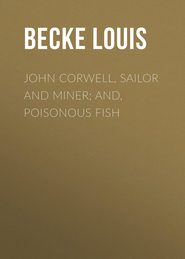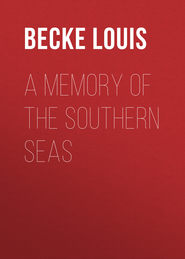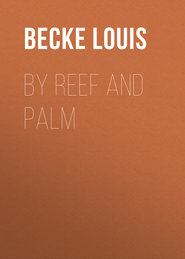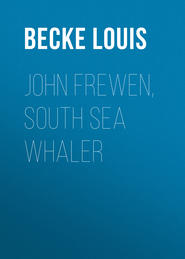По всем вопросам обращайтесь на: info@litportal.ru
(©) 2003-2024.
✖
The Tapu Of Banderah
Настройки чтения
Размер шрифта
Высота строк
Поля
“No. Who’s going to tell about it? You and your people won’t.”
“What ‘bout Missa Blount? What ‘bout mission’ry?”
Bilker grinned savagely. “Peter and Burrowes say they will kill Blount if I give them another five hundred sovereigns.”
“What ‘bout mission’ry and mission’ry woman?”
For a moment or two Bilker, crime-hardened villain as he was, hesitated. Then he raised his head and looked into the dark face of the native chief. Its set, savage expression gave him confidence.
“Plenty missionaries get killed. And, all the man-o’-war captains know that the Mayou bush-men[2 - “Bushmen,” a term applied to natives living in the interior of the Melanesian Islands.] are very savage. Some day—in about a week after I have gone away in the schooner, you will take the missionary and his wife to the little bush town, that Peter and Burrowes tell me he goes to sometimes. They will sleep there that night. You and some of your people will go with them and sleep in the same house with them. You do that sometimes, Banderah, eh?”
“Yes, sometimes.”
This was perfectly true. The bush tribes on Mayou, although at war with Banderah and his coast tribes, yet occasionally met their foes in an amicable manner at a bush village called Rogga, which had been for many decades a neutral ground. Here Banderah and his people, carrying fish, tobacco, and bamboos filled with salt water,[3 - Having no salt, the bush tribes of Melanesia, who dare not visit the coast, buy salt water from the coast tribes. They meet a a spot which is always sacredly kept as a neutral ground.] would meet small parties of bush people, who, in exchange for the commodities brought by Banderah, would give him yams, hogs, and wild pigeons. At several of these meetings Mr. Deighton had been present, in the vain hope that he might establish friendly relations with the savage and cannibal people of the interior.
“Well,” resumed the ruffian, “you will sleep at Rogga with the missionary and his wife. In the morning, when you and your people awake, the missionary and his wife will be dead. Then you will hurry to this place; you will go on board the man-of-war and tell the captain that the bad bushmen killed them when they were asleep.”
“I savee. Everybody savee Mayou man-a-bush like kill white men.”
“That’s it, Bandy. No one will say you did it.”
“What ‘bout Peter an’ Burrowes? Perhaps by and by those two fellow get mad with me some day, and tell man-o’-war I bin kill three white man and one white woman.”
“Banderah,” and Bilker slapped him on the shoulder, “you’re a damned smart fellow! There’s no mistake about that. Now look here, I want you to get another thousand sovereigns—the thousand I am going to give to Burrowes and Peter. And after the man-a-bush have killed the missionary and his wife, they are coming down to the beach one night soon after, and will kill the two white men. Then there will be no more white men left, and you’ll be the biggest chief in the world—as big as Maafu Tonga.”
A curious smile stole over the grim features of the chief.
“By God! Cap’en, you savee too much; you dam fine man altogether.”
“Well, look here now, Banderah. Are you going to do it?”
“Yes, I do it right enough.”
“When?”
“To-mollow.”
“To-morrow will do. And, look here, Bandy, I’m going to give you ten sovereigns each for the men I took away from you.”
“All right,” answered the chief, “now you go away. I want go and look out for some good men come along me to-mollow.”
“Right you are, Banderah. Take plenty good men. You know what to do—white men walk along swamp to shoot duck, then one, two,” and Captain Bilker made a motion with his right hand that was perfectly comprehensible to the chief.
Banderah sat perfectly quiet on his mat and watched the captain return to Burrowes’ house, from where a short time after he emerged, accompanied by his two fellow-conspirators. Then the three of them hailed the schooner. A boat put off and took them on board.
An hour or two later Blount returned along the beach from Lak-a-lak, and walked slowly up the path to his house. Just as he entered the door the sounds of revelry came over to him from the schooner, whose lights were beginning to glimmer through the quick-falling darkness of the tropic night. Some one on board was playing an accordion, and presently he caught the words of a song—
“Remember, too, the patriots’ gore That flecked the streets of Baltimore; Maryland, my Maryland.”
“Burrowes only sings that when he’s very drunk,” he said to himself, as he sat down to drink a cup of coffee brought to him by his eldest daughter Taya. “No doubt he and that anointed sweep Bilker are having a very happy time together.”
“Father,” said the girl in the native tongue, as he put down his cup, “Banderah is here. He came but now, and will not come inside, but waits for thee in the copra-house, lest he be seen talking to thee.”
“What the devil is wrong?” muttered Blount, as without waiting to touch the coffee prepared for him he went outside to the copra-house.
In half an hour he and the native chief came out together, and as they stood for a minute in the broad streak of light that streamed out from the lamp on the table in the big room, Taya, who sat in the doorway, saw her father’s face was set and stern-looking.
“Shed thou no blood, Banderah,” he said in the native tongue, “not even that of these two dogs who have eaten and drunk in my house for four years.”
“Challi,[4 - Charlie.] that is hard. Already are my people thirsty for the blood of this dog of a captain—he who stole thirty and one of my people. And because of my brother, who was stolen with them, have I promised them vengeance. But the other two who are with him on the ship I will spare.”
“As you will. And as for these two dogs who have planned to kill me, with them I shall deal myself. If, when the schooner saileth away from here, these men go not with her, then shall I shoot them dead.”
“Good,” and then grasping the white man’s hand, the chief pressed his nose to his, and vanished in the darkness.
IV ~ “DEATH TO THEM BOTH!”
Early on the following morning Messrs. de Vere and Morcombe-Lycett—the latter being now quite recovered—informed Mr. and Mrs. Deighton that, having heard from the two traders there was good shooting at the big swamp, they were going there under the guidance of Banderah and a party of natives; and shortly after breakfast the chief, accompanied by a number of his people, appeared.
“I will send with you two of my best men,” said Mr. Deighton, indicating a couple of his pet converts, who stood by dressed for the occasion in white starched shirts and black coats, but minus trousers, of which garments the pet converts had divested themselves, knowing that they should have to wade through the swamp.
But suddenly, to the missionary’s astonishment, Banderah, with a savage look, bade them stay where they were. He had, he said, plenty of men, and did not need Mr. Deighton’s servants.
Presently the two yachting gentlemen, arrayed in a very stylish sporting get-up, appeared with their breach-loaders and cartridge-belts, and waving their hands gracefully to the missionary and his wife, disappeared with Banderah and his dark-skinned companions into the dense tropical jungle, the edge of which was within a very short distance of the mission station.
For about an hour the Honourable Morcombe-Lycett and Mr. de Vere, with Banderah leading the way, walked steadily onward through the jungle. Not a word was spoken among the natives who followed close at their heels, and Banderah himself, in answer to their frequent questions, replied only by monosyllables..
At last they came out of the stifling heat of the thick jungle, and saw before them a great reedy swamp, the margin fringed by a scanty growth of cocoanut and pandanus palms. Out upon the open patches of water, here and there showing upon the broad expanse of the swamp, they saw large flocks of wild duck feeding and swimming about, betraying not the slightest fear at their approach.
“By Jove, Baxter,” said Mr. de Vere to his friend, “looks good enough, doesn’t it? I wonder if these blasted niggers will go in for us.”
“Of course they will. But let us have a drink first. Here, you, bring us that basket. I wonder what sort of tucker old Godliness has given us. He’s not a bad sort of an ass. His wife, too, isn’t bad.”
“Bah,” and Mr. de Vere twirled his long, yellow moustache, “you’re always finding out something nice in the face of every woman you come across. Wait until we get up to Japan; then you can amuse yourself with a new type of woman. Be a bit of a change for you after the Melbourne and Sydney peroxided-hair beauties. Here, nigger, give me that corkscrew.”
“I say, Dalton,” suddenly remarked his friend, “‘pon my soul I believe we are making a mistake in going to Japan. You may be sure that we’ll have a lot of trouble awaiting us there.”
“Not a bit of it Before we get there every one will have read the cable news that we have been seen in Callao, and no one in Yokohama will ever think of associating Mr. Herbert de Vere and the Honourable Morcombe-Lycett—just arrived from Manila via Singapore in the Spanish mail-steamer—with—er—hum—the two gentlemen who arrived at Callao from Tahiti, after successfully diddling the Australian financial public of thirty thousand quid.”
“But what are we going to do with the schooner at Manila?”
“Sell her, my innocent! Sell her to our esteemed friend, Mr. Moses Steinberg, who has assisted me in previous financial transactions—before I had the pleasure of meeting my present valued colleague, the Honourable Mr. Morcombe-Lycett—and who is now taking care to inform the world that we are living in South America.”
“And how are we going to account for our boxes of sovereigns? Two mining speculators don’t usually carry about heavy sums in gold.”
“All managed, my boy. My friend, Mr. Moses Steinberg, will see to that. The ten thousand sovereigns will be valuable gold specimens from Queensland, and will be placed on board the North German Lloyd’s steamer at Singapore for safe conveyance to London, where you and I, my dear boy, will follow it And there also we shall find, I trust, an additional sum of fifteen thousand lying to our credit—the proceeds of our honest toil.”
“What are you going to do with Sykes?”











